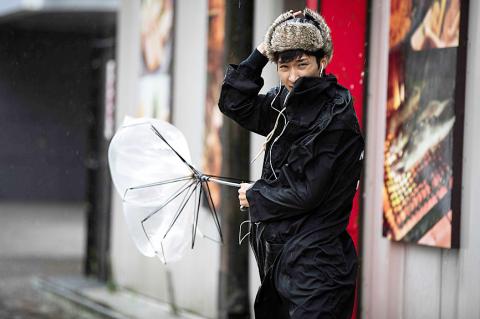A powerful typhoon yesterday pounded Japan’s mainland after injuring dozens on outlying islands, bringing transport grinding to a halt and triggering warnings of fierce winds, torrential rain, landslides and floods.
Typhoon Trami has already snarled travel in the world’s third-biggest economy, with bullet train services suspended, more than 1,000 flights canceled and Tokyo’s evening train services scrapped.
The storm’s huge eye was forecast to move near the city of Osaka before churning across the Japanese archipelago, likely hitting areas still recovering from extreme weather that has battered Japan in the past few months.

Photo: AFP
In total, 65 people have sustained minor injuries — mainly cuts from shattered glass — and one woman was reported missing in the Miyazaki region, which was drenched by record rainfall and suffered localized flooding.
According to local media, the woman, in her 60s, was swept away by gusts in a gutter while working with her husband in their rice field.
Nationwide, authorities have issued non-compulsory evacuation advisories to 1.5 million residents, according to public broadcaster NHK, and officials urged people across the country to stay indoors.
Nearly 500,000 households in the western region of Kyushu and Okinawa have lost power, local utilities said.
Violent gusts and heavy rain made it impossible to venture outside, said Yuji Ueno, an official in the town of Shirahama in Wakayama Prefecture, which was forecast to be right in Trami’s path.
“From about 2pm, we saw incredible winds and rain. I stepped outside the city hall in the afternoon, and the rain was swirling in very strong wind. Enormous wind,” Ueno said.
“It was difficult to stay standing. It was very scary,” Ueno added.
As the typhoon barrelled east, rail authorities took the highly unusual step of canceling evening train services in Tokyo, one of the world’s busiest networks, urging passengers to shelter indoors when the storm hits.
The typhoon was not expected to hit the capital head-on, but strong winds and heavy rain were still feared from later yesterday. Some businesses were already putting up shutters and hunkering down.
Trami is the latest in a string of extreme natural events in Japan, which has suffered typhoons, flooding, earthquakes and heatwaves in the past few months, claiming scores of lives and causing extensive damage.
Packing maximum gusts of 216kph, Trami was expected to travel over most of the archipelago, weakening slightly, but causing extreme weather into today, forecasters said.
Still classed as a “very strong” typhoon, Trami pounded Kagoshima on the western tip of Japan early yesterday, causing minor injuries — such as cuts from broken windows and people knocked over by gusts.
The western city of Osaka lay close to the path of the storm and its Kansai Airport, which is situated on reclaimed land offshore and suffered extensive damage in a storm earlier last month, closed two runways.
Officials piled up sandbags to avoid a repeat of flooding seen during the previous storm.

The CIA has a message for Chinese government officials worried about their place in Chinese President Xi Jinping’s (習近平) government: Come work with us. The agency released two Mandarin-language videos on social media on Thursday inviting disgruntled officials to contact the CIA. The recruitment videos posted on YouTube and X racked up more than 5 million views combined in their first day. The outreach comes as CIA Director John Ratcliffe has vowed to boost the agency’s use of intelligence from human sources and its focus on China, which has recently targeted US officials with its own espionage operations. The videos are “aimed at

STEADFAST FRIEND: The bills encourage increased Taiwan-US engagement and address China’s distortion of UN Resolution 2758 to isolate Taiwan internationally The Presidential Office yesterday thanked the US House of Representatives for unanimously passing two Taiwan-related bills highlighting its solid support for Taiwan’s democracy and global participation, and for deepening bilateral relations. One of the bills, the Taiwan Assurance Implementation Act, requires the US Department of State to periodically review its guidelines for engagement with Taiwan, and report to the US Congress on the guidelines and plans to lift self-imposed limitations on US-Taiwan engagement. The other bill is the Taiwan International Solidarity Act, which clarifies that UN Resolution 2758 does not address the issue of the representation of Taiwan or its people in

US Indo-Pacific Commander Admiral Samuel Paparo on Friday expressed concern over the rate at which China is diversifying its military exercises, the Financial Times (FT) reported on Saturday. “The rates of change on the depth and breadth of their exercises is the one non-linear effect that I’ve seen in the last year that wakes me up at night or keeps me up at night,” Paparo was quoted by FT as saying while attending the annual Sedona Forum at the McCain Institute in Arizona. Paparo also expressed concern over the speed with which China was expanding its military. While the US

SHIFT: Taiwan’s better-than-expected first-quarter GDP and signs of weakness in the US have driven global capital back to emerging markets, the central bank head said The central bank yesterday blamed market speculation for the steep rise in the local currency, and urged exporters and financial institutions to stay calm and stop panic sell-offs to avoid hurting their own profitability. The nation’s top monetary policymaker said that it would step in, if necessary, to maintain order and stability in the foreign exchange market. The remarks came as the NT dollar yesterday closed up NT$0.919 to NT$30.145 against the US dollar in Taipei trading, after rising as high as NT$29.59 in intraday trading. The local currency has surged 5.85 percent against the greenback over the past two sessions, central